Introduction
In the world of productivity tools, Notion has emerged as a game-changing platform that blends wikis, documents, and project management into one cohesive workspace. Whether you’re an individual looking to organize your life or a company seeking a unified knowledge base, Notion offers a customizable and intuitive solution. This SaaS deep dive explores why Notion has become a leader in productivity software, its technology, business model, and how it stacks up against its competitors.
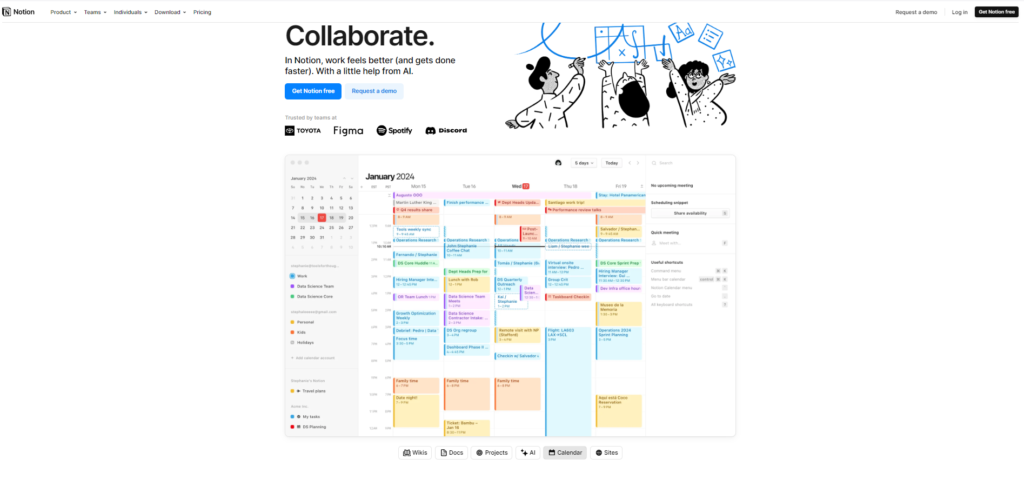
1. Notion’s Business Model: Combining Freemium and Paid Plans
Notion follows a freemium business model, offering a feature-rich free plan alongside paid tiers that unlock more advanced features. This model has allowed Notion to capture both individual users and businesses, growing its user base rapidly.
Free Plan
- For Individuals: The free plan includes essential features such as unlimited pages, blocks, and the ability to share with up to five guests.
- Limited File Uploads: Users can upload files up to 5MB, which is sufficient for many personal use cases.
Paid Plans
- Personal Pro: At $5 per month, this plan removes the guest limit and increases file upload size to unlimited, making it suitable for more intense personal use.
- Team Plan: At $10 per user/month, this plan offers advanced collaboration features like shared teamspaces, admin tools, and advanced permissions.
- Enterprise Plan: Aimed at larger companies, this plan includes SAML single sign-on (SSO), advanced security features, and custom roles.
Why This Model Works:
- Attracting Users Easily: The free plan allows users to experience Notion’s core functionality without commitment, which naturally leads to an organic upgrade when their needs grow.
- Catering to Different Segments: Notion is ideal for individuals, small teams, and large enterprises alike, adapting its features to fit the specific needs of each group.
Notion Product Suite: A Holistic Workspace for Teams and Individuals

Notion is more than just a platform for wikis and documents—it’s an integrated toolset designed for modern teams, offering everything from task management to websites, all in one place. Here’s a quick breakdown of the main products within Notion, and how each one enhances productivity.
1. Notion Calendar
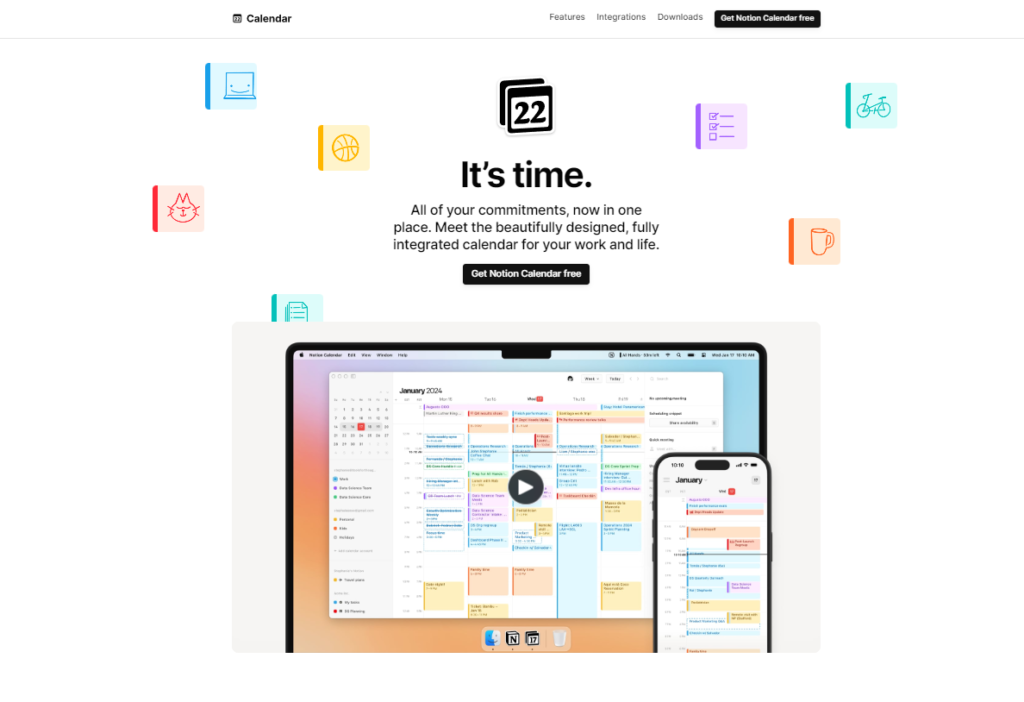
Notion’s calendar feature provides users with an intuitive way to manage time, appointments, and projects. Integrated directly into the Notion workspace, it brings both work and life together in one seamless view.
- Key Features:
- Multi-Calendar Sync: Combine work and personal calendars to avoid conflicts.
- Time Zone Management: Easily work across global teams by visualizing schedules in different time zones.
- Built-In Scheduling: Share availability, create meetings, and join them directly from the menu bar without switching apps.
2. Notion Sites

With Notion Sites, users can create and publish websites effortlessly, no coding required. Whether it’s for personal use, portfolio building, or business purposes, Notion provides a fast, drag-and-drop solution for launching sites.
- Key Features:
- Choose from 10,000+ templates to get started.
- Customize your domain, theme, and look to suit your brand.
- Publish with one click and have your site ready instantly.
This makes Notion an excellent choice for small businesses or freelancers who need an easy and integrated way to publish online.
3. Task & Project Management
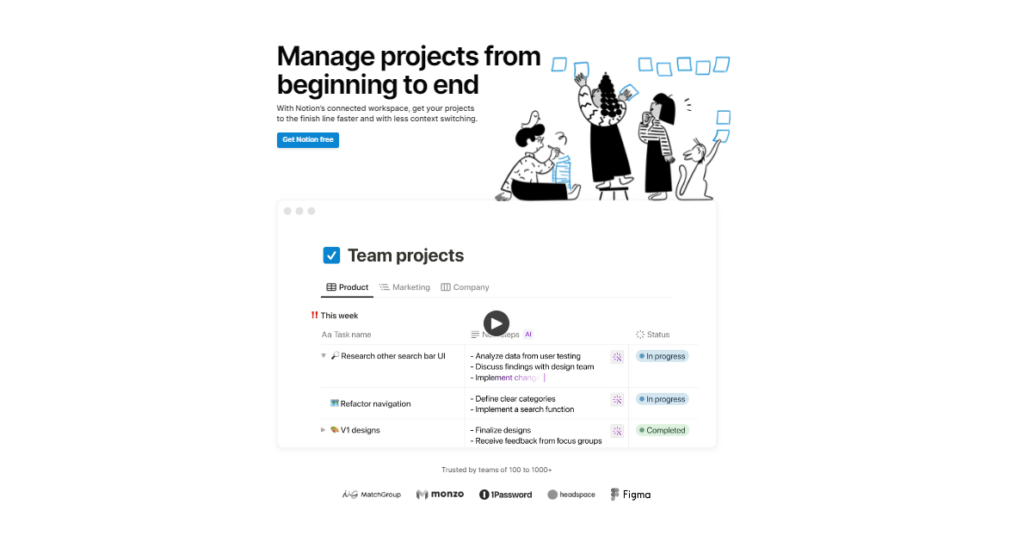
Notion simplifies task tracking and project management with its highly visual approach. Users can manage tasks across various projects, visualize work in multiple formats like Kanban boards or tables, and stay on top of deadlines with progress tracking and dependencies.
- Key Features:
- Sub-Tasks & Dependencies: Break down complex projects into manageable tasks.
- Priority Labels: Customize task labels and priorities to fit team needs.
- Kanban Boards & Gantt Charts: Easily switch between different views to track project progress.
This product is critical for teams looking to organize workflows and collaborate in real-time.
4. Notion Templates
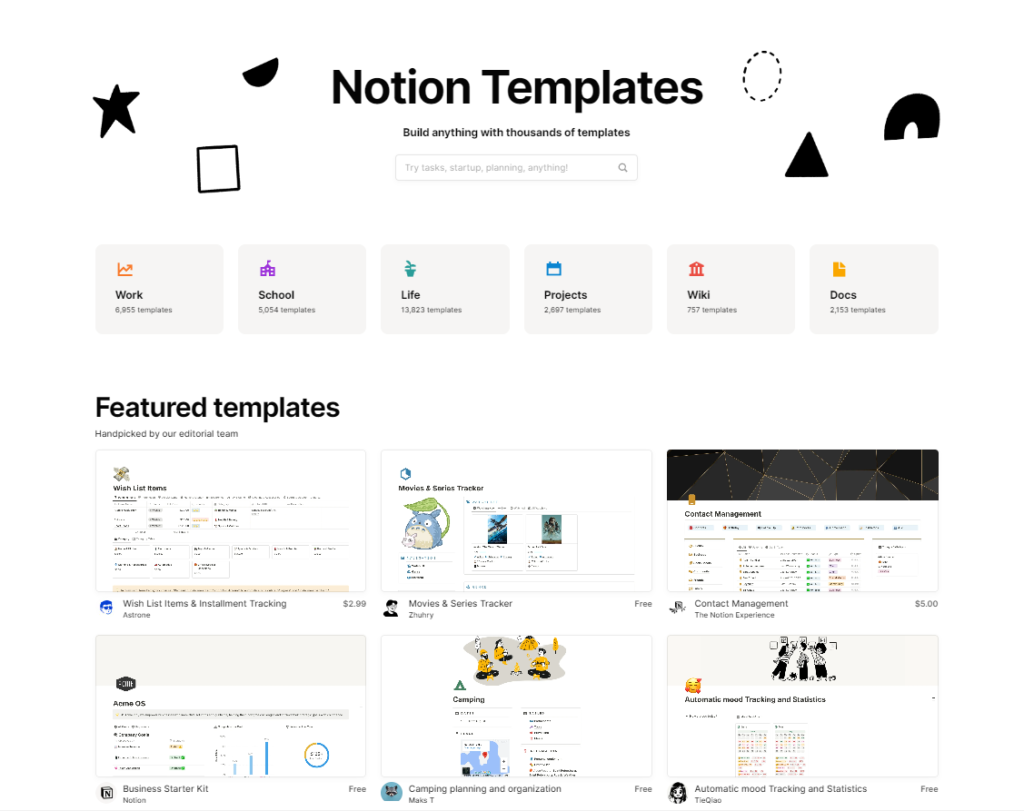
Notion’s extensive template library covers everything from personal organization to enterprise-level workflows. With over 20,000 templates available, users can find pre-made layouts that cater to their unique needs.
- Key Features:
- Templates for Work, Life, and Projects, including specialized categories like Startups, Content Planning, and Wikis.
- Featured Creators: Notion’s marketplace allows users to buy or use templates from top creators, unlocking even more customization and productivity options.
Templates save time and make it easy for users to implement structured systems without having to start from scratch.
5. AI Integration & Automation

One of the most powerful tools in Notion is its AI-powered automation features. Users can leverage AI Autofill to generate first drafts for tasks, project outlines, and even full documents, speeding up content creation and planning.
- Key Features:
- Automate repetitive tasks like filling in updates, drafting project reports, or managing project timelines.
- Use AI Suggestions to improve drafts and make content more efficient.
AI tools save teams and individuals a lot of time, allowing them to focus on higher-level work.
6. Integrated Collaboration Tools
Notion seamlessly integrates with external tools like Google Calendar, Slack, GitHub, Zoom, and Figma to streamline team workflows. These integrations bring all essential tools into one workspace, reducing the need to switch between apps.
- Key Features:
- Google Calendar Sync: Schedule meetings and track deadlines directly from Notion.
- Slack and Zoom Integration: Collaborate in real-time through messages or meetings.
- GitHub Integration: Sync pull requests, issues, and repos for seamless development workflows.
7. Wiki & Docs for Teams
At its core, Notion remains an ideal platform for wikis and documentation, allowing teams to create, share, and organize knowledge across different departments.
- Key Features:
- Easily create knowledge hubs to document processes, guidelines, and project details.
- Collaborate on documents in real-time with commenting, version history, and tagging.
- Permission Settings allow admins to control who can view, edit, or share specific pages.
Whether it’s used as a personal knowledge base or a full-scale company wiki, this feature is essential for creating collaborative knowledge systems.
2. The Technology Behind Notion: Versatility Meets Simplicity
At its core, Notion’s appeal lies in its modular approach—users can create anything from simple notes to complex project management systems, all within a flexible interface. The platform leverages a combination of modern frameworks and technologies to provide a smooth, responsive, and customizable experience.
A Modular Structure
- Building Blocks: Each element in Notion, from a paragraph of text to a kanban board, is treated as a “block.” This modular approach makes it easy to drag, drop, and reorganize content, allowing users to customize their workspace with ease.
- Relational Databases: Notion allows users to link databases, creating relationships between different tasks, notes, or projects. This is particularly useful for managing large workflows or company-wide wikis where interconnected data is critical.
Performance and Integration
Notion’s performance is enhanced by a variety of technologies that ensure fast load times, real-time collaboration, and smooth transitions between tasks. Here’s an in-depth look at the technologies that power Notion, based on data gathered from BuiltWith:
Analytics and Tracking Tools
- Mixpanel: Notion utilizes Mixpanel for workflow optimization and analyzing how users interact with the platform. This helps the Notion team make informed decisions on feature improvements.
- Marketo & Clearbit: These tools provide marketing automation and help streamline Notion’s sales processes, focusing on audience segmentation and workflow optimization.
- Hotjar & Amplitude: These analytics platforms are used to gather user feedback, generate heatmaps, and provide insights into user behaviors, allowing Notion to improve the product continuously based on real-world usage.
Content Delivery and Cloud Infrastructure
- Amazon Web Services (AWS): Notion leverages Amazon S3 for scalable storage and Amazon CloudFront as a Content Delivery Network (CDN) to ensure fast load times for users across the globe.
- Cloudflare: Notion uses Cloudflare CDN to optimize the delivery of web pages and protect the site from malicious attacks, while Cloudflare Bot Manager mitigates harmful bot activity and enhances website security.
Web and Mobile Development
- React: As a core JavaScript library, React powers the front end of Notion, providing users with a dynamic and smooth user interface. This is crucial for its modular and interactive experience.
- Next.js & Express: Notion uses Next.js, a React.js framework that allows for server-side rendering, ensuring that content loads quickly. Express.js is employed to handle backend processes.
Tag Management and Tracking
- Google Tag Manager: This allows Notion to implement and manage marketing tags easily without changing code, helping them track user activity and enhance marketing campaigns.
- Google Analytics & Segment: Notion employs Google Analytics to measure audience engagement, while Segment simplifies sending user data to analytics services, allowing the Notion team to track customer journeys seamlessly.
Payment and Financial Management
- Stripe: Notion utilizes Stripe for payment processing, allowing users to easily subscribe to paid plans using credit cards or other payment methods. This also ensures secure and reliable handling of financial transactions.
Real-Time Collaboration and User Experience Enhancements
- Statsig: This platform helps Notion track real-time data to see how different features and updates affect user behavior. It allows the team to optimize performance based on actual usage data.
- Sprig: A research platform used to gather feedback during the product development lifecycle, helping Notion continuously improve its user experience through real-time user input.
- ProfitWell: Notion tracks subscription metrics using ProfitWell, ensuring its revenue growth aligns with user engagement and satisfaction.
Security and Compliance
- US Privacy User Signal Mechanism: Notion ensures compliance with U.S. privacy laws by using this API, allowing users to manage their privacy preferences and data sharing settings.
- HSTS and SSL Encryption: Notion enforces HTTPS across all its traffic through HSTS, which ensures secure communications between users and the platform.
- Let’s Encrypt & Amazon SSL: These services help Notion manage SSL certificates for secure web connections, ensuring that user data remains protected during interactions with the platform.
Mobile Optimization
- Smart App Banner and Apple Mobile Web App Capable: These features enhance Notion’s mobile experience by allowing users to access Notion directly from their smartphones, whether through a dedicated app or mobile web browser, ensuring mobile compatibility and app-like functionality on iOS devices.
Content Management and Developer Tools
- Contentful & Webflow: Notion uses Contentful, a headless CMS, to manage its content across multiple platforms, while Webflow assists in designing custom web experiences without needing to code.
3. SEO and Content Strategy: Building a Loyal User Base
Notion’s growth has been largely driven by its organic search traffic and content marketing, rather than aggressive paid advertising. SEMrush data reflects this emphasis on organic strategies.
Organic Traffic Insights (SEMrush Data):
- Authority Score: Notion’s domain authority stands at 76, indicating a high level of trust and relevance in search engines.
- Organic Search Volume: Notion attracts 5.9 million organic visitors per month, which is a strong indicator of its robust SEO and user engagement
- Keywords: Notion ranks for 697,890 keywords, driving significant organic traffic, with top keywords like “Notion” (550K searches), “Notion app,” and “Notion templates” contributing heavily to this
Content Strategy:
- Educational Blogs and Tutorials: Notion’s content focuses on informative and actionable tutorials, addressing productivity tips and how-tos. This helps users discover new ways to use the platform.
- Templates and Public Workspaces: The platform’s library of templates and public workspaces provides immediate value to users, offering versatile solutions for various workflows.
By centering its strategy around educational content and enhancing user experience through valuable resources, Notion has built a loyal community that advocates for the product, further fueling its organic growth
4. Competitor Analysis: How Notion Stands Out
Notion operates in a competitive landscape that includes strong rivals such as Airtable, Evernote, and Trello. Despite the competition, Notion differentiates itself through flexibility and customization, especially in the areas of project management and knowledge management.
Versus Airtable:
- Notion’s Strength: Notion excels at creating flexible knowledge hubs with its combination of wikis and documents.
- Airtable’s Edge: Airtable shines when it comes to advanced database functionalities, making it ideal for users who need powerful data manipulation.
Versus Evernote:
- Notion’s Strength: Notion’s flexibility in creating structured workflows far surpasses Evernote, offering users more customization options.
- Evernote’s Edge: Evernote provides a simpler interface focused on note-taking, appealing to those who prefer a minimalistic tool.
Versus Trello:
- Notion’s Strength: Notion offers a broader range of features, including Kanban boards, wikis, and documents, making it versatile for more comprehensive project management.
- Trello’s Edge: Trello is known for its lightweight, easy-to-use Kanban-style project management, which appeals to teams looking for simplicity
5. Monetization and Growth Strategy
Notion has experienced rapid growth, particularly in the remote work era, where the need for connected, collaborative workspaces has surged. By balancing a freemium model with paid plans targeted at businesses, Notion has been able to monetize effectively while keeping its user base satisfied.
Potential for Future Monetization:
- Premium Templates Marketplace: Introducing a marketplace where users can buy and sell advanced templates could provide an additional revenue stream.
- B2B Integrations: Building more powerful B2B integrations with tools like Slack and Microsoft Teams could deepen enterprise adoption.
- Advanced Analytics for Teams: Offering teams more in-depth analytics about how employees are using Notion could add value for businesses looking to optimize workflows.
6. Notion’s Financial Growth: Funding, Valuation, and Revenue Expansion
Notion has experienced tremendous growth since its launch, backed by a series of high-profile funding rounds and impressive user acquisition. Let’s delve into the financial journey that has fueled its rise as a top SaaS platform for productivity and collaboration.
Funding Overview: Notion has raised an estimated total of $340 to $350 million through multiple rounds of funding. Some of the most notable rounds include:
- Series B (April 2020): Notion raised $50 million, led by investors like Index Ventures and Coatue Management. This round came during the COVID-19 pandemic when demand for remote work tools surged globally.
- Series C (October 2021): Notion secured a significant $275 million in its Series C round, led by Coatue Management and Sequoia Capital. This brought Notion’s post-money valuation to an impressive $10 billion, establishing it as a major player in the productivity software market. This funding aimed to support global expansion, product development, and new feature releases .
Revenue Growth and User Base: Notion’s revenue growth has been directly linked to its strong user acquisition strategy, which combines a freemium model with tiered paid plans. Here are some key metrics:
- Paying Users: Notion currently has over 4 million paying users, which include both individuals and enterprise-level customers. The platform’s flexibility appeals to a wide range of users, from students to large corporate teams.
- Total Users: Including free users, Notion boasts a user base of over 20 million users globally. This growth is partly driven by Notion’s free plan, which introduces users to the platform and encourages them to upgrade to paid plans as their needs evolve.
Valuation and Financial Outlook: Following its Series C funding round, Notion’s valuation surged to approximately $10 billion. This valuation reflects Notion’s ability to capture significant market share in the productivity and collaboration space. The company’s hybrid business model of individual subscriptions and enterprise accounts has allowed it to build consistent revenue streams, which are expected to grow in the coming years as more teams transition to remote or hybrid work setups .
7. Future Growth and Strategic Opportunities
As Notion continues to evolve, several opportunities exist for further growth and innovation:
- Mobile App Enhancements: While Notion’s mobile app is functional, improving its offline capabilities and UI could drive even greater adoption, particularly among on-the-go professionals.
- Expansion into Enterprise Market: By enhancing security features like data residency and advanced permissions, Notion could capture more of the enterprise market, especially in sectors like finance and healthcare.
- AI-Powered Features: Introducing AI-powered features such as smart search, auto-tagging, and workflow automation could help Notion users save time and increase productivity.
Conclusion
Notion’s rise to prominence in the SaaS world has been fueled by its flexible, all-in-one approach to workspaces. From wikis to project management, Notion’s modular system allows users to build the exact setup they need. Coupled with a strong freemium model, robust technology infrastructure, and strategic content marketing, Notion is well-positioned to continue its upward trajectory.
As it continues to evolve, Notion’s focus on integrations, mobile experience, and enterprise features will be crucial to maintaining its growth and staying ahead in the competitive productivity space.
Ready to streamline your work? Explore how Notion can transform the way you organize, collaborate, and manage projects. Whether you’re an individual, small team, or large enterprise, Notion has the tools you need to succeed.
Get started with Notion today! – Try it for free or unlock the full potential with a paid plan. Notion AI can also help you write better, faster, and more efficiently.

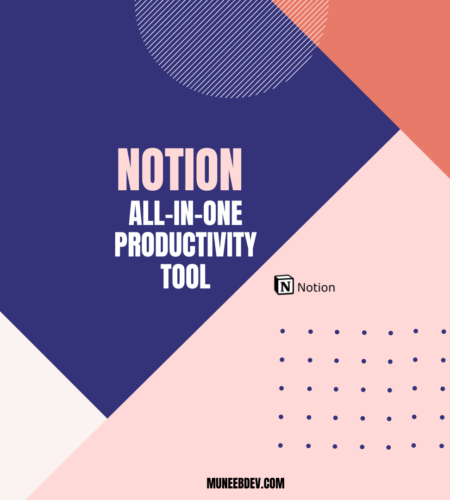
Comments